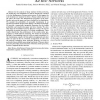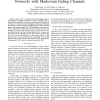1020 search results - page 2 / 204 » The Poisson Fading Channel |
CORR
2007
Springer
13 years 4 months ago
2007
Springer
—In the analysis of large random wireless networks, the underlying node distribution is almost ubiquitously assumed to be the homogeneous Poisson point process. In this paper, th...
GLOBECOM
2008
IEEE
13 years 11 months ago
2008
IEEE
— Adaptive modulation and antenna diversity are two important enabling techniques for future wireless network to meet demand for high data rate transmission. We study a Markov de...
JSAC
2006
13 years 4 months ago
2006
For fading broadcast channels (BC), a throughput optimal scheduling policy called queue proportional scheduling (QPS) is presented via geometric programming (GP). QPS finds a data ...
WIOPT
2011
IEEE
12 years 8 months ago
2011
IEEE
—Most work on wireless network throughput ignore the temporal correlation inherent to wireless channels, due to trouble with tractability. In order to better capture the temporal...
CORR
2007
Springer
13 years 4 months ago
2007
Springer
—This paper addresses three issues in the field of ad hoc network capacity: the impact of i) channel fading, ii) channel inversion power control, and iii) threshold–based sche...


